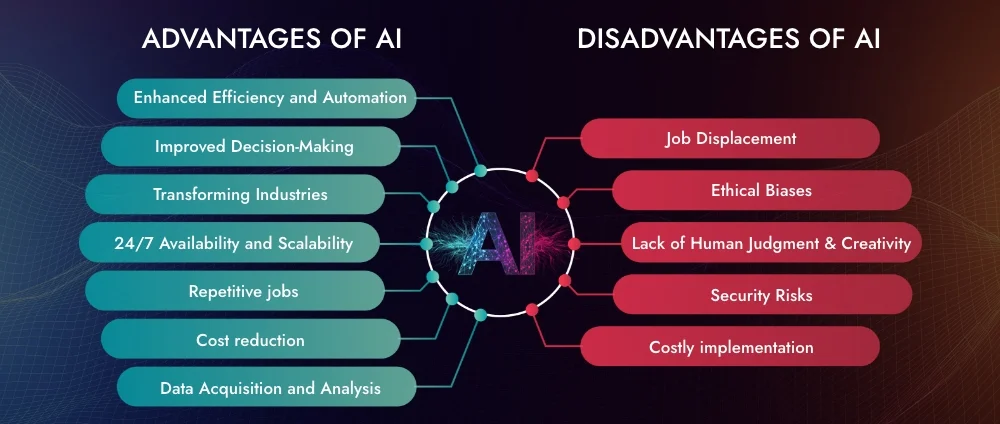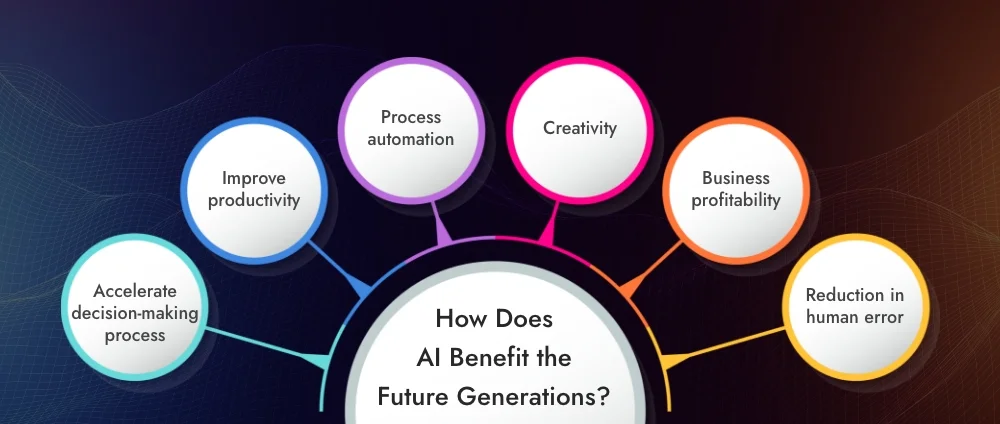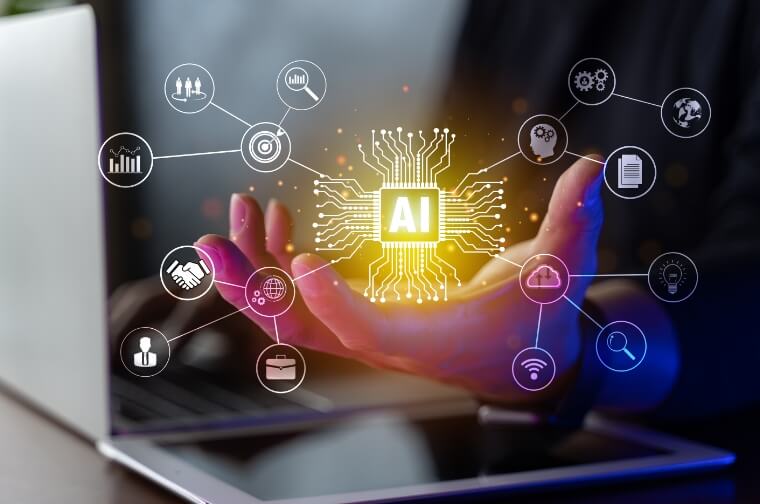Given the state of technology today, AI dominates headlines, sparking debates about its potential risks and rewards. Its omnipresence in daily consumer life underscores its value for businesses across the globe. Yet, amidst this rapid evolution, one crucial question looms: will AI emerge as a transformative force for societal good or signal impending challenges?
Walk through the advantages and disadvantages of AI in this blog, and apply it in your business accordingly.
What are the advantages and disadvantages of AI?
Before walking through the pros and cons of AI, let’s understand what AI is. It is a program that is capable of learning and reasoning. Any program that performs a task we would typically expect a human to perform can be considered artificial intelligence.
While artificial intelligence has numerous advantages, it also has some disadvantages. Artificial Intelligence benefits include increased efficiency through task automation, data analysis for informed decisions, support with medical diagnostics, and the evolution of self-driving vehicles. The disadvantages of AI include job displacement, ethical issues about bias and privacy, security problems from hacking, and a lack of human-like creativity and empathy.
Let us start with the pros of artificial AI.

Advantages of AI (Artificial Intelligence)
Everyone understands that AI gives firms an advantage. Precedence Research projects the U.S. AI market size to reach around $594 billion by 2032. That’s a compound annual growth rate of 19% from 2023. The advantages of AI applications have the potential to drastically transform a number of future areas or businesses, including the following:
Enhanced efficiency and automation
AI excels at repetitive tasks, freeing up human time and resources. A study by McKinsey Global Institute estimates that AI could contribute up to $12 trillion to the global economy by 2030. Think of AI-powered robots handling complex assembly lines in factories or intelligent algorithms streamlining data analysis for businesses.
Improved decision-making
AI can study huge amounts of data to spot patterns and trends imperceptible to the human eye. This allows companies and organizations to make data-driven decisions, improving resource distribution and streamlining procedures.
Transforming industries
AI is transforming numerous sectors. In healthcare, AI-powered diagnostics aid early disease detection, while in finance, AI algorithms streamline risk assessment and fraud prevention.
24/7 availability and scalability
Many studies have shown that humans are productive for only 3 to 4 hours daily. Humans need breaks and time off to maintain a healthy work-life balance. However, AI is capable of working indefinitely without interruption. They think far faster than humans and can complete numerous jobs simultaneously with correct outcomes. They can even tackle demanding, repetitive tasks with the help of AI algorithms.
Repetitive jobs
Even the most intriguing career has its share of tedious or repetitive tasks. These could include tasks like entering and analyzing data, creating reports, confirming information, etc. Using an artificial intelligence program can relieve individuals of the boredom of repeated activities, freeing up their energy for more creative work.
Cost reduction
As previously said, AI can work around the clock and provide more value on the same day as a human worker. Furthermore, because AI may assist in automating manual and monotonous jobs, it frees personnel to perform more skilled tasks. This finally adds value for the end user or consumer.
Data acquisition and analysis
When it comes to data processing, the amount of data generated far outstrips humans’ ability to grasp and analyze it. AI algorithms can help digest more significant amounts of complex data, making it more usable for analysis.
Disadvantages of AI ( Artificial Intelligence )
With all the benefits of AI outlined above, implementing AI for your organization may be a no-brainer. However, it is also essential to consider the potential drawbacks of such a significant adjustment. Adopting AI has numerous advantages, but drawbacks include setup costs and degradation over time.
Job displacement
A significant concern surrounding AI is its potential to automate jobs currently performed by humans. While some jobs may be replaced, others will be created, requiring new skill sets to work alongside AI systems.
A robot is one example of an AI application displacing jobs and increasing unemployment (in some circumstances). As a result, some argue that chatbots and robots will always be able to replace humans, increasing the likelihood of unemployment.
Ethical biases
The quality of AI algorithms depends on the data they are trained on. Biased data sets can lead to discriminatory outcomes in areas like loan approvals or recruitment. Mitigating bias in AI development is crucial for ensuring fairness and ethical use.
Lack of human judgment and creativity
While AI is excellent at data analysis and automation, it needs more human capacity for critical thinking, creativity, and emotional intelligence. Human oversight and collaboration will remain essential in tasks requiring these skills.
Security risks
As AI becomes more sophisticated, the potential for misuse by malicious actors becomes a concern. Robust cybersecurity measures are essential to safeguard AI systems from hacking and manipulation.
Costly implementation
The most significant and obvious disadvantage of integrating AI is its development can be exceedingly expensive. The cost of using AI varies depending on what you need it for. According to one estimate, the cost of a fully developed AI solution ranges between $20,000 to millions of dollars for most firms.
The expense is offset later when the AI is completely integrated and can assist in optimizing the procedure. However, the upfront expense might be scary, if not prohibitive.
Get ready to develop AI solution that used in daily life?
How is Artificial Intelligence used in daily life?
AI is already deeply ingrained into our everyday experiences. From the time you wake up to a smart alarm clock to personalized recommendations on your favorite streaming service, AI is silently working behind the scenes. Here are a few examples:
- Smartphones: Facial recognition for unlocking your phone, personalized news feeds, and voice assistants like Siri or Google Assistant all leverage AI.
- Transportation: Ride-hailing apps like Uber and Lyft utilize AI algorithms to optimize routes and predict traffic patterns.
- Streaming Services: The recommendations you see on Netflix or Spotify are powered by AI, analyzing your viewing habits and preferences.
How does AI benefit the future generations?
AI can potentially transform various fields, impacting future generations in various ways. Here’s a glimpse into the possibilities:

- Accelerate decision-making process: AI helps people make decisions faster by quickly analyzing vast amounts of data.
- For example, AI can analyze medical records in healthcare to help doctors diagnose diseases more accurately and promptly.
- Improve productivity: AI automates repetitive tasks, allowing people to focus on more complex and creative work.
- For instance, in manufacturing, AI-powered robots can assemble products faster and more efficiently than humans alone.
- Process automation: AI automates tasks that would otherwise require human intervention, saving time and reducing errors.
- For example, in customer service, AI-powered chatbots can handle routine inquiries, freeing up human agents to handle more complex issues.
- Creativity: AI can assist in generating new ideas and solutions by analyzing existing data and patterns.
- For instance, in music composition, AI algorithms can generate original pieces based on a musician’s style and preferences.
- Business profitability: AI helps businesses optimize operations, reduce costs, and identify new revenue opportunities.
- For example, AI-powered recommendation engines in retail can increase sales by suggesting personalized products to customers based on their preferences and purchase history.
- Reduction in human error: AI systems are less prone to making mistakes than humans, leading to more accurate outcomes.
- For example, in finance, AI algorithms can detect fraudulent transactions with greater accuracy and speed than human analysts.
This is just a glimpse into AI’s vast potential. Responsible development is crucial as AI evolves to ensure a brighter future for future generations.
Maximize the advantages of AI with ViitorCloud
As organizations embrace AI, they must commit to openness, justice, and data privacy, ensuring that the transformative power of AI is used properly.
Given this, ViitorCloud recognizes the promise of AI and aims to guide businesses embarking on their journey to digital transformation through AI. From strategic AI consultancy to custom AI solutions, we provide focused assistance to businesses at every stage of their journey with our expert-led digital transformation services. We offer comprehensive Artificial Intelligence services to empower businesses to utilize AI for increased efficiency, data-driven decision-making, and a competitive edge. Our team of AI experts can help you develop personalized AI solutions to your specific needs.
Do you need a team of AI experts to support your digital transformation efforts? Let’s team up. Contact ViitorCloud today for a consultation!
Frequently asked questions
Artificial intelligence is woven into the fabric of our daily lives. It personalizes our online experiences by recommending products we might like or suggesting news articles relevant to our interests. In healthcare, AI assists doctors in analyzing medical images for faster diagnoses and helps develop personalized treatment plans.
AI offers a multitude of benefits. Automating repetitive tasks can increase efficiency, freeing human time and resources for more complex endeavours. AI algorithms can analyze vast amounts of data to identify patterns and trends, leading to improved decision-making across various fields.
While AI holds immense potential, there are also potential drawbacks to consider. One concern is job displacement, as AI automates tasks previously performed by humans. Another challenge is ensuring the ethical use of AI, as algorithms can perpetuate existing biases if not carefully designed and monitored.

Vishal Patel
Vishal Patel is an experienced Solution Consultant with a proven track record in the information technology and services industry.
